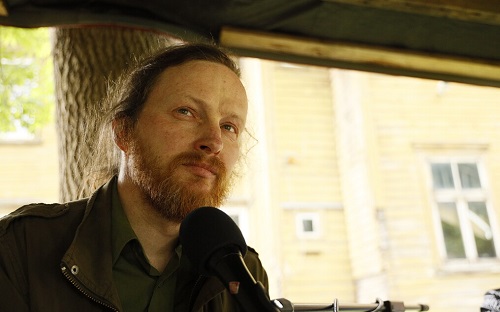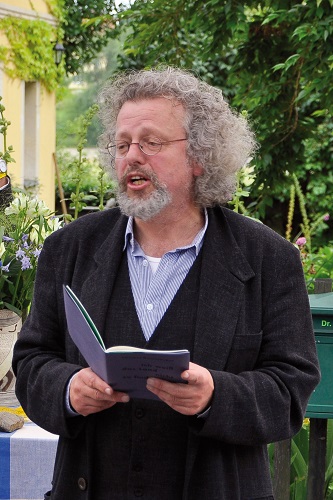De Estse schrijver Mehis Heinsaar werd geboren op 1 augustus 1973 in Tallinn. Zie ook alle tags voor Mehis Heinsaar op dit blog.
Uit: The Traveller’s Happiness
“The traveller’s happiness came from Latvia. Who knows what kind of mood it was in when it came or who sent it on its way, but in any case, it came with a big southern wind. Together with late summer clouds it sailed over large forests and felled areas, over rivers and villages like a sparkling wind or vaporized water – without a sound, color, or scent – carrying further and further towards Estonia. Over Ruhja and Ungurini, over Lilli and Karksi, until the squall blew him into the mouth of a man in the middle of Halliste as he was yawning in his own yard. Happiness slid down his windpipe, straight to the exhausted stomach from various food and drinks, mixing there with glands and acids, carrying long exhausted rivers of nerves to the brain and the soul, received an imagine and thought for itself, eyes and hearing, finally understood that his name is now Aap Anderson and thought while rejoicing:
„Yes, yes, I am a 50 year-old man already, I have worked hard all my life and I have 3 healthy and strong children, 4 bank accounts, 2 houses, a wife whom I don’t love, though who loves me more than that, and also a lover in Haapsalu who keeps my soul young. I couldn’t want anything more from life!”
And the traveller’s happiness went into the room and made a fire in the fireplace, stuffed his pipe full of tobacco and poured himself 50 grams. Yes, it’s good to be alive!
Having drank his cognac and lit his pipe, happiness now remembered his former youth and first love, that beautiful and poor girl, whom he had left in the name of a better life, years of endless hard work on different farms, beautiful moments spent with friends fishing and in the mountains and now all this brought wistful tears to his eyes.
„Yes, yes, I have lived a difficult but interesting life,” he thought. „I have worked and seen poverty, amassed wealth, gained respect and despite an ulcer and kidney stones I am doing better and better.”
But then happiness became bored for some reason in this totally exhausted and wheezy body and left through the pipe smoke and breath from Aap Anderson, flying from the house through an open window and with a southern wind further towards Viljandi.
It was carried over yellow cornfields, green fir groves and low alder trees as scentless and colorless plankton, as a subtle flicker until one insect-catching swallow accidently bit it and swallowed it. The traveller’s happiness now became a swallow and glided up and down hunting insects, with lightening-quick dashes forwards and backwards, feeling enjoyment from the warm light around him and the sweet meat of the flies, though the bird cast him out of his backside at Mustla and happiness rained down straight as bird shit into the eye of a man laying down in the grass. He jumped up frightened, rubbed his eyes and thus pressed happiness ever deeper into his skull, intestines and nerves, until happiness finally fused with the man and understood that his name is now Venjamin the metal worker, that he is missing his left hand and his liver is worn out through drinking, though life is still beautiful and worth all that mi¬sery. Happiness looked for a time more together with Venjamin between the nomadic clouds and swallows among of them, drank half a bottle of vodka lounging on the grass next to him, then, while smiling, tore a strap from his belt and went into the room whistling to beat his wife.”

De Duitse dichter en schrijver Thomas Rosenlöcher werd geboren op 29 juli 1947 in Dresden. Zie ook alle tags voor Thomas Rosenlöcher op dit blog.
Het paradijs van het bekijken
Diep de struiken. De lieve God ziet alles.
Lieve God? Wie gelooft er nog in
zei ze terwijl we neerhurkten
en ik met een onderzoeksstokje,
ow, doet dat pijn? haar van binnen raakte.
Een teer ingelijst, lusjesachtig rood.
Het diepste mysterie in de wereldgeschiedenis.
Zelfs het stokje rook ernaar.
En aangrenzend begon een haan te kraaien,
totdat hij het hoogste kraaipunt bereikte
en onze lichtgroene bladerenholte
in het sijpelende licht bevroor tot zwaar goud,
maar boven ons, als keek God toch toe,
doemde een schaduw op: “Hou op, mijn moeder.”
En met gebogen knieën, naar voren stappend,
naar voren leunend, de struik opzij houdend,
keek zij ons daarbinnen met een serieuze bril aan:
Wat doen jullie toch daar beneden in de struiken –
Kom eruit, viezerikken! – Oh, we slopen
langs haar heen alsof we elkaar nooit hadden
ontmoet: laat je hier nooit meer zien!
Een uitgestrekte arm die me voor altijd
uit het paradijs van het bekijken verdreef.
Vertaald door Frans Roumen

Zie voor nog meer schrijvers van de 1e augustus ook mijn blog van 1 augustus 2020 en eveneens mijn blog van 1 augustus 2019 en ook mijn blog van 1 augustus 2017 en ook mijn blog van 1 augustus 2011 deel 3.
